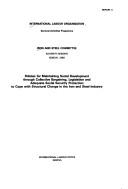| Listing 1 - 7 of 7 |
Sort by
|
Book
Year: 1986 Publisher: Cambridge, Mass. National Bureau of Economic Research
Abstract | Keywords | Export | Availability | Bookmark
 Loading...
Loading...Choose an application
- Reference Manager
- EndNote
- RefWorks (Direct export to RefWorks)
This study uses a Cox proportional hazards model to estimate ther elationship between state-level collective bargaining policies and union growth in the public sector. The proportional hazards analysisis performed with data on approximately eight hundred municipal police departments. The timing of unionization in these departments clearly indicates that unionization rarely precedes the enactment of a statute. Where bargaining laws have not been enacted, formal collective bargaining between municipalities and their police is virtually nonexistant. Moreover, the proportional hazards analysis that controls for the effects of other state-level and municipal-level covariates indicates that the bargaining laws and policies are the most important determinant of unionization among police. Among different types of bargaining policies, "duty-to-bargain" provisions lead to higher unionization rates than do statutes that permit, but do not require, employers to bargain with police. However, after controlling for for the effects of other covariates, there appears to be no difference in the unionization rates between the states that have duty-to-bargain provisions along with an interest arbitration mechanism and those states that have duty-to-bargain provisions without such a dispute resolution mechanism.
Collective bargaining --- Government employees. --- Government employees

Abstract | Keywords | Export | Availability | Bookmark
 Loading...
Loading...Choose an application
- Reference Manager
- EndNote
- RefWorks (Direct export to RefWorks)
Collective bargaining --- Collective bargaining --- Iron and steel workers --- Iron and steel workers --- Social security --- Iron industry --- Steel industry --- Effect of technological innovations on --- Government policy
Book
ISBN: 2707115967 9782707115966 Year: 1986 Volume: 415 Publisher: Paris : La Découverte,
Abstract | Keywords | Export | Availability | Bookmark
 Loading...
Loading...Choose an application
- Reference Manager
- EndNote
- RefWorks (Direct export to RefWorks)
Industrial relations --- Collective bargaining --- Relations industrielles --- Négociations collectives --- Corporate culture --- Labor unions --- Négociations collectives --- Industrial relations - France --- Collective bargaining - France --- Corporate culture - Fr --- Labor unions - France --- SOCIOLOGIE DES ORGANISATIONS --- CULTURE D'ENTREPRISE
Book
ISBN: 9221052842 9222052846 9789222052844 Year: 1986 Publisher: Geneva
Abstract | Keywords | Export | Availability | Bookmark
 Loading...
Loading...Choose an application
- Reference Manager
- EndNote
- RefWorks (Direct export to RefWorks)
Décrit les mécanismes généraux de la négociation collective et donne des conseils : comment présenter une revendication? Comment se déroule une négociation? Quel est le rôle de l'Etat?...
Labour conflicts --- Collective bargaining --- Handbooks, manuals, etc. --- AA / International- internationaal --- 332.11 --- -331.89 --- Bargaining --- Labor negotiations --- Industrial relations --- Negotiation in business --- Arbeidscontract. Collectieve arbeidsovereenkomsten. --- 331.89 --- Handbooks, manuals, etc --- Arbeidscontract. Collectieve arbeidsovereenkomsten --- Travail (Négociations collectives du). --- Collectieve arbeidsonderhandelingen.

ISBN: 0709926243 9780709926245 Year: 1986 Publisher: London
Abstract | Keywords | Export | Availability | Bookmark
 Loading...
Loading...Choose an application
- Reference Manager
- EndNote
- RefWorks (Direct export to RefWorks)
Firms and enterprises --- Personnel management --- Collective bargaining --- International business enterprises --- Négociations collectives --- Entreprises multinationales --- Employees --- Legal status, laws, etc. --- Personnel --- Droit --- Employees. --- BPB0610 --- 658.315 --- Relations between management and workforce within the firm --- 658.315 Relations between management and workforce within the firm --- Legal status, laws, etc --- Négociations collectives --- Business enterprises, International --- Corporations, International --- Global corporations --- International corporations --- MNEs (International business enterprises) --- Multinational corporations --- Multinational enterprises --- Transnational corporations --- Business enterprises --- Corporations --- Joint ventures --- Bargaining --- Labor negotiations --- Industrial relations --- Negotiation in business --- Employees&delete& --- International business enterprises - Europe - Employees. --- Collective bargaining - International business enterprises - Europe. --- International business enterprises - Employees - Legal status, laws, etc. - Europe.
Book
ISBN: 9282560996 9789282560990 Year: 1986 Volume: vol *428
Abstract | Keywords | Export | Availability | Bookmark
 Loading...
Loading...Choose an application
- Reference Manager
- EndNote
- RefWorks (Direct export to RefWorks)
Collective bargaining --- Management --- Négociations collectives --- Personnel --- Employee participation --- Participation à la gestion --- Industrial management --- Technological innovations --- Labor supply --- Law and legislation --- Effect of technological innovations on --- P4 --- Academic collection --- 351.83*6 <493> --- -Labor supply --- -Technological innovations --- -#SBIB:316.334.2A440 --- Sociaal-economisch overleg 331.105.41 --- 67.002 --- 331.152 : sociaal overleg - democratisering, economisch - democratisering van/in de onderneming - industriële democratie (zie ook 301.173.8, 321.7) --- 331.152.001 --- Breakthroughs, Technological --- Innovations, Industrial --- Innovations, Technological --- Technical innovations --- Technological breakthroughs --- Technological change --- Creative ability in technology --- Inventions --- Domestication of technology --- Innovation relay centers --- Research, Industrial --- Technology transfer --- Labor force --- Labor force participation --- Labor pool --- Work force --- Workforce --- Labor market --- Human capital --- Labor mobility --- Manpower --- Manpower policy --- Business administration --- Business enterprises --- Business management --- Corporate management --- Corporations --- Industrial administration --- Management, Industrial --- Rationalization of industry --- Scientific management --- Business --- Industrial organization --- Europa --- Vakverenigingsrecht. Recht i.v.m. vakorganisaties--België --- -Law and legislation --- -Arbeidssociologie: het strategisch optreden van de partijen in de collectieve arbeidsverhoudingen: algemeen --- nieuwe technologieën - technologische vernieuwing --- medezeggenschap - medebeheer - inspraak van werknemers - arbeiderscontrole - participatie van de arbeiders --- 351.83*6 <493> Vakverenigingsrecht. Recht i.v.m. vakorganisaties--België --- Négociations collectives --- Participation à la gestion --- #SBIB:316.334.2A440 --- Arbeidssociologie: het strategisch optreden van de partijen in de collectieve arbeidsverhoudingen: algemeen --- 331.152 --- sociaal overleg - democratisering, economisch - democratisering van/in de onderneming - industriële democratie (zie ook 301.173.8, 321.7) --- Industrial management - Employee participation - Law and legislation - Belgium --- Technological innovations - Law and legislation - Belgium --- Labor supply - Effect of technological innovations on - Belgium
Book
ISBN: 0691228221 Year: 1986 Publisher: Princeton, N.J. : Princeton University Press,
Abstract | Keywords | Export | Availability | Bookmark
 Loading...
Loading...Choose an application
- Reference Manager
- EndNote
- RefWorks (Direct export to RefWorks)
Applying an original theoretical framework, an international group of historians and social scientists here explores how class, rather than other social bonds, became central to the ideologies, dispositions, and actions of working people, and how this process was translated into diverse institutional legacies and political outcomes. Focusing principally on France. Germany, and the United States, the contributors examine the historically contingent connections between class, as objectively structured and experienced, and collective perceptions and responses as they develop in work, community, and politics. Following Ira Katznelson's introduction of the analytical concepts, William H. Sewell, Jr., Michelle Perrot, and Alain Cottereau discuss France; Amy Bridges and Martin Shefter, the United States; and Jargen Kocka and Mary Nolan, Germany. The conclusion by Aristide R. Zolberg comments on working-class formation up to World War I, including developments in Great Britain, and challenges conventional wisdom about class and politics in the industrializing West.
Working class --- Working class --- Working class --- History --- History --- History --- United States. --- Germany. --- France. --- Activism. --- Agriculture. --- Anti-Socialist Laws. --- Apprenticeship. --- Aristocracy. --- Artisan. --- Bourgeoisie. --- Capitalism. --- Class conflict. --- Class consciousness. --- Collective action. --- Collective bargaining. --- Decentralization. --- Division of labour. --- Domestic worker. --- E. P. Thompson. --- Economic development. --- Economic growth. --- Eight-hour day. --- Emigration. --- Employment. --- Factory system. --- Factory. --- Government. --- Handicraft. --- Household. --- Ideology. --- Immigration. --- Industrial Revolution. --- Industrial Worker. --- Industrial production. --- Industrial relations. --- Industrial society. --- Industrialisation. --- Industry. --- Institution. --- Journeyman. --- Labor aristocracy. --- Labor history of the United States. --- Labor relations. --- Laborer. --- Labour movement. --- Legislation. --- Local government. --- Major party. --- Manual labour. --- Manufacturing. --- Martin Shefter. --- Marxism. --- Mass movement. --- Mass production. --- Mechanization. --- Middle class. --- Militant (Trotskyist group). --- Party leader. --- Peasant. --- Political alliance. --- Political machine. --- Political party. --- Political science. --- Political spectrum. --- Politician. --- Politics. --- Proletarianization. --- Protest. --- Prussia. --- Putting-out system. --- Radicalism (historical). --- Reformism. --- Republicanism. --- Salary. --- Skilled worker. --- Social class. --- Social democracy. --- Social history. --- Social movement. --- Social structure. --- Strike action. --- Suffrage. --- Sweatshop. --- Syndicalism. --- Tariff. --- Tax. --- Textile industry. --- The Making of the English Working Class. --- Trade association. --- Trade union. --- Tradesman. --- Unemployment. --- Union Movement. --- Universal suffrage. --- Urbanization. --- Voting. --- Wage slavery. --- Wage. --- Welfare. --- Workforce. --- Working class. --- Workplace. --- World War I.
| Listing 1 - 7 of 7 |
Sort by
|

 Search
Search Feedback
Feedback About UniCat
About UniCat  Help
Help News
News